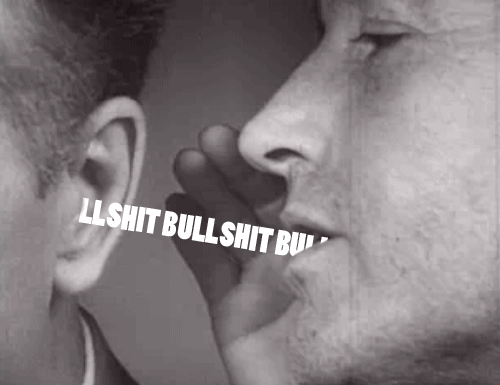Friend of mine asked if I know of any good baseball podcasts and off-the-top-of-my-head, I don’t. Suggestions are welcome.
Here to Stay
Kay, that is.
Ghost in the Machine
On Lance Armstrong and Manti Te’o, Patrick Hruby says: Print the Legend.
The King of New York
Over at SB Nation’s Longform page, check out Joe DePaolo’s long and considered piece on Mike Francesa:
Then, there is the case of ESPN’s “Sports Guy,” Bill Simmons. The two have been mutual admirers for some time. In a fawning 2006 column Simmons called Mike and the Mad Dog “my favorite radio show ever.” Francesa, in turn, views Simmons as incredibly witty and when Russo left the show in 2008, he even called Simmons to gauge his interest in co-hosting. Since then, Francesa has watched Simmons’s role at ESPN expand from writer and editor to serving as host of his own podcast – The BS Report – and appearing on ESPN’s NBA pregame show, NBA Shootaround. Francesa does not seem to approve.
“When you find something you’re good at, stick with it,” Francesa says – voicing a personal philosophy that runs counter to Simmons’s recent career developments.
“I think what happens in our business is that people get to a certain level, and then they’re like, ‘OK. I have to go prove I can do this now.’ Why? Why can’t you just stay there and do it really well? When you do something well, why can’t you stay there, and perfect it, and prove that you can do it really well?”
In response to a direct question about Simmons, Francesa shares an experience from his own career, illustrating a fundamental difference between the two iconic personalities. “A year-and-a-half into Mike and the Mad Dog, I got offered an enormous TV deal to leave, and I turned it down. It was the best decision I ever made. I could’ve left. But understanding where you belong, and understanding where you’re supposed to be and what you’re good at – I never entertained another serious offer. But I had a very serious offer that was wide in scope, and was a very big opportunity. And I turned it down.”
[Photo Credit: Craig Ruttle, Newsday]
You Can Go Home Again
The Marvelous One returns to Brooklyn. Over at Grantland, Bryan Curtis has the story.
Bronx Banter Interview: Mickey Herskowitz
Head on over to Sports on Earth and check out my Q&A with Mickey Herskowitz about Jock, his short-lived but wonderful magazine.
Here’s Mickey talking about Woody Allen and Paul Simon:
Q: I like the non-sports-writing celebrities you featured in the magazine, like William F. Buckley and Woody Allen.
A: I called Woody Allen’s agent, [Jack] Rollins and [Charles] Joffe. I don’t know whether I talked to Rollins or Joffe. I told him I was running a magazine called Jock and wanted to know if Woody would be available to write a piece about what it was like growing up playing stickball in New York. He said, “I doubt it, but I promise you I’ll mention it to him.” An hour later I got a call from Rollins or Joffe, and he said, “Yeah, Woody would love to do it. He’s doing a play, ‘Play it Again, Sam,’ and does two shows on Sunday. Come between the matinee and the evening performance, bring a photographer and you can get your story and your pictures.”
Q: So it was ghostwritten by you?
A: No. I went there and Woody dictated it to me, it wasn’t ghostwritten. And he said, “What are you doing to do for photographs?” I told him I thought we’d just take a couple of shots of him there in his dressing room. “That doesn’t make any sense,” he said, “not if you’re doing a story on stickball. I know a perfect brownstone about four or five blocks away, let’s go down there.” So about six of us walked down past Eighth Avenue to this brownstone. I had two of my kids with me, they were like 10 and 11, and two of their friends, and they were the rest of the teams. Woody had a stick and a ball, and one of the kids pitched to him and the others played in the field. And that’s where we got the pictures.
Q: All-schoolyard.
A: Now, we did this shoot before the Mets had won the pennant, and after they won I get a call from one of Woody’s managers. He said, “Woody wanted to know if he could ask you a big favor?” I said, “Sure.” “Can you get him four tickets to the World Series?” Honest to God I had to bite my tongue. Are you kidding me? You don’t think that Woody Allen would mean more to the Mets than Mickey Herskowitz from Houston, Texas? For some reason that didn’t occur to him. So I called the Mets PR guy and got him tickets to every home game. Next week I got a handwritten “thank you” note from Woody.
Q: You also had an encounter with Paul Simon, right?
A: I sure did. I was thinking of stories, and it dawned on me that Rollins and Joffe also managed Paul Simon. “The Graduate” had come out, and the song “Mrs. Robinson” was everywhere. So I called up and asked if they thought Paul would be willing to do a story for me on what it was like growing up as a Yankee fan. And Rollins or Joffe said, “Well, I don’t know. I didn’t think Woody would do a story and he did. We’ll ask Paul.” The next day I’m sitting in my office … the secretary put a call through and the voice said, “Mickey?” I said, “Yeah.”
“This is Paul.”
“Paul, who?”
“Paul Simon.”
I was stunned that Paul Simon called. I said: “Paul, jeez, terrific of you to call, and call back so quickly. And to call back yourself. Everybody usually goes through three or four layers of gatekeepers, I’m really impressed.” He said, “Well don’t be. It’s an everyday courtesy.” He talked about what I had pitched and said, “I think it’s a groovy idea and I’d love to do it.” And so I explained what I wanted but also said I’d love it if he could talk about the Joe DiMaggio line, which everyone was so touched by. It took everybody back to nostalgia in their lives.
Q: What did he say about it?
A: He said the line just came to him. He hadn’t had DiMaggio in mind, but his name came to him; he had to have a long enough name to fit the melody. It was funny because he told me that a month or so after the song hit big he was on a TV show with Mickey Mantle and Mantle said, “How come you used DiMaggio’s name in your song and not mine?” Simon said he had to explain to him that it had to do with the melody and not the name.
Q: That’s funny that Mantle asked him. Because he was also a player of Simon’s generation more than DiMaggio.
A: That’s right. Anyhow, we didn’t talk long, maybe about 10 minutes. I was out of things to say. But I was so flattered and grateful for the call, I felt like I had to say something. So I told him that “Mrs. Robinson” was my favorite song. I made it up; it was such a dumb, bulls— thing to say, but I felt I had to say something complimentary to him for calling. There was a pause on the other line. And the next thing he said was: “You didn’t like ‘Bridge Over Troubled Water’?” You talk about the insecurity of an artist?
Q: He was straight, he wasn’t joking?
A: I said, “Oh, no, no, no. ‘Mrs. Robinson’ was my favorite sports song. I love ‘Bridge Over Troubled Waters.’” And the truth is, I didn’t know what he was talking about. I had been hearing it for weeks but didn’t know the name of it.
Here’s more on how Jock came to be.
Bronx Banter: Before we get to Jock magazine, let’s talk about your early career in Houston.
Mickey Herskowitz: I don’t need to exaggerate what a sports-nuts state Texas is. In fact, the most famous line I ever wrote was when one of the Super Bowl’s came here, I tried to explain Houston and one of my stories started, “We never knew how important Religion was in Texas until people started comparing it to high school football.”
And so way back, I was with the Houston Post.
BB: This was before Wells Twombly, right?
MH: Well before Wells, about ten years before he came along and then he was at the Houston Chronicle. The funny thing is I hired Wells to write for Jock and then had to renege when we started running out of money. He was really hurt. I couldn’t tell him that we were going broke at the time so I had to make up some sleazy excuse. Years later, he asked me about it and I told him the truth. So anyway, I was at the Houston Post and a couple of guys came to me and wanted to have a magazine about sports in Texas. This was the year Elvin Hayes was leading the University of Houston to prominence in college basketball. So a couple of advertising guys came to me and they had a little bit of money.
BB: You were a columnist at this time for the Post, right?
MH: I was in my twenties but a columnist.
BB: You’re younger than Dan Jenkins then.
MH: I was the next generation. Blackie [Sherrod], Dan, a wonderful writer in Fort-Worth named Jim Trinkle, Orville Henry in Fayetteville and Dave Campbell in Waco, Dan Cook in San Antonio, a named Jack Gallagher in Houston, those were the top-rated writers in the state as far as sports went. Bud Shrake came a little later. Gary Cartwright came after that. I don’t know if I was their mascot but they all looked after me.
BB: And you grew up in Houston?
MH: I was born there in the late 1930s. I remember Blackie never missing a chance to pay me a compliment. And years later when Dan was at Sports Illustrated he actually referred to me in print as the best baseball writer in America. Dan told me that on Mondays or Tuesdays when the out of state newspapers came into the office there’d be a scramble to get the Houston Post to see what my ledes were on the Astros ballgames. He really told me that. They brought me up there and offered me a job and I reluctantly turned it down because I was doing a TV show and a radio show in Houston along with the column and the money couldn’t match the three jobs I had back home. The three jobs in Houston were probably easier to handle than one in New York because of the cost of living.
BB: This was before Jock?
MH: Yes, and getting back to Jock, I had these advertising guys come to me about doing a magazine about sports in Texas and if it made sense to do something about sports anywhere that’s where you would start. It was called Sport Folio. I didn’t have any literary figures but I had all the top sports writers in Houston and Dallas, Austin. It was a monthly.
BB: Did you model it after Sport magazine?
MH: No. I stayed at the Post, this was a part-time job. Truth is, I modeled it after Esquire, which is what I did with Jock, as well. Sport Folio lasted about a year. Par for the course, ran out of money the second year. Then about a year after that I got a call from Chris Schenkel. Some money people out of Dallas were going to put out a magazine out called Chris Schenkel’s Sport Scene. Chris was the Bob Costas of his day, the go-to-anchor of his time. Did the Olympics forever, a lot of golf, was a terrific football play-by-play announcer, basketball too. SI did a great cover story on him. At one time he was the biggest name in sports broadcasting. He was the anti-Cosell. Totally factual, understated, non-dramatic. And a golden voice. So Chris called and asked if I would commute to Dallas an edit the magazine. And I did. I had Blackie and Jenkins and Steve Perkins who was a fine writer from Dallas and been in New Orleans.
BB: SI would let Jenkins moonlight for you?
MH: I say I had Jenkins, he maybe did one story for me on TCU but he did it under the radar. He wasn’t freelancing for anyone else.
BB: Did you have Gary Cartwright?
MH: No. I want to put this the right way so it doesn’t seem like a criticism but at that time Gary was still young and he was fourth or fifth in line behind Dan, Blackie and Bud Shrake. Thing about Gary is that he just got better and better and he’s still around of course. But we only had four or five big stories per issue so I didn’t have a big line up. Sports Scene was in mind a success because it was really classy. The people who owned it put a lot of money into it. It was glossy. We could go anywhere and write about anything. I covered the Olympics for that magazine in ’68. And what happened was an advertising guy in New York saw Sports Scene. Keep in mind New York magazine had just made a big splash and was a big success. There may have been city magazines at the time but they were small. In Houston, you had one that strong-armed ads for dentists and doctors and lawyers. Had little fashion stories, luncheons.
BB: They were provincial.
MH: Right. They were not for reading. They were beautiful and glossy but no content. New York was the first real city magazine unless I’m overlooking something in Boston of Philadelphia. So this advertising guy saw Sport Scene and compared it to New York, which was showing a profit after three years, which if you know magazines, is rare. You are lucky to show a profit after three years, hell, you are lucky to still be in business after three years. The stock market had had a real go-go run from about ’66-’68 and he thought he could take the model of Sport Folio and Sport Scene and get a Wall Street company to back it. And that’s exactly what we did.
BB: Did you move to New York?
MH: I did. Had an apartment in the same building with the mayor though he didn’t live there. John Lindsay played tennis with Hank Greenburg outside my window on Sundays. I was at Sutton Place. Cost me about $295 a month to park my car and a luxury apartment in Houston at the time cost about $350.
BB: Did the deal happen quickly?
MH: I flew to New York and met with their key sales people. It was like Alice in Wonderland. I’m almost embarrassed. It was so easy because so many people love sports. The only people they invited to the business meeting were the ones that were nuts about sports. Why wouldn’t they want to take this company public? I called coach Paul Bear Bryant, Jimmy Demerit, AJ Foyt, Cosell, Curt Gowdy, that was my role.
BB: You wanted them to invest in the magazine?
MH: No, no, they agreed to be on the board of directors and each got 10,000 shares. They did it as a favor, nobody asked for anything. But it was a marquee lineup. We went public in June of 1969, just as the recession began. In July, the Mets were 9 games out of first place. I came up with the idea for the first cover. It would be 4 or 5 Met players raising the flag on Iwo Jima except it was on the pitcher’s mound. That was on the inaugural issue, must be worth a pretty penny today. Cleon Jones, Tom Seaver, Ed Kranepool and those guys.
BB: This was after the Jets had already won the Super Bowl.
MH: The same year. And the Knicks had lost to the Bullets in the playoffs but they won the championship the following season, in June of 1970.
BB: New York hasn’t seen a banner year like that since.
Stayed tuned. All week, we’ll be featuring a different article from Jock.
Up Close and Personal
I take no pleasure in being the schmuck writer who points out that TV sports documentaries — also called “vérité sports” — have gotten really good. And not just good, but observant. TV is recording the small, telling details of an athlete’s life, capturing noisy moments and quiet moments, doing the delicate labor that sportswriters — if properly motivated — pride themselves on doing. So on behalf of writerdom, I ask: What the hell is going on?
[Photo Credit: Trent Park via Black Book]
Sweet Dreams Are Made of This
This is the best thing I’ve seen all week. Thank you, Hardball Talk.
And Bobby Valentine Punched Me in the Mouth
Bobby Valentine went on the radio yesterday and it didn’t go well. He talked to reporters about his interview at the ballpark last night.
Over at Sports on Earth, Emma Span considers what’s turned into a misbegotten chapter in the career of one Bobby V.
[Featured Illustration: Justin Peele]
Up Jump the Boogie
My profile of the late George Kimball appeared on Deadspin last December. I worked long and hard on that piece and was proud of the effort. And now some nice personal news I’d like to share with you…
It’s been selected to The Best American Sports Writing 2012 (Edited by Mike Wilbon).
Derek Jeter fist pump.
And this:
[Photo Credit: Fiftyfootshadows]
Didcha Hear?
The trade deadline comes today at 4 p.m. Over at SI.com, Cliff sets the stage.
Be sure to check in on Hardball Talk and MLB Trade Rumors for all the latest gossip and news.
[Photo Credit: Gruesome Twosome; Challenger]
Hail to the Chief
Bob Ryan retired last night. A veteran newspaperman, he distinguished himself covering basketball. Here’s a book he co-wrote with Terry Pluto that is worth reading; here’s another, about minor league baseball that’s solid, too.
Ryan loves baseball–his final column (subscription required) is about Kevin Youkilis. He’s also one of the few TV talking heads who is funny, smart, but doesn’t take himself too seriously.
He’s had a fine career. Salute.
[Photo Credit: Yoon S. Byun/Boston Globe]
Testing One, Two (Is This Thing On?)
I’m going to be at Gelf’s Varsity Letters Speaking Series in Brooklyn this Thursday with Rob Fleder and Steve Rushin. Come on out if you are around.
Meanwhile, check out the Q&A I did over at Gelf.
Love Story
The good folks at Deadspin have this excerpt from Frank Deford’s new memoir. It concerns Granny Rice.
Have at it.
Clown College
Steve Kerr advocates raising the NBA’s age limit over at Grantland. His argument is that the NBA is better served financially by having players in college longer. And in the end, Steve, isn’t what’s in the best financial interests of the NBA really what’s best for America?
The dreckiest sentence in this mountain of dreck is this one: “Why should NBA franchises assume the responsibility and financial burden of player development when, once upon a time, colleges happily assumed that role for them?”
Let’s rewrite that question for Steve, but add one single ounce of humanity and perspective: “Why should anyone other than the NBA assume the responsibility and financial burden of player development?” Steve thinks the NBA is entitled to reap the corrupted benefits of the professional basketball player factory that is the NCAA.
And thank goodness for the NCAA. Assuming responsibilty over here and financial burden over there, all out of the goodness of their collective heart. The NCAA and NBA have concocted a virtually risk-free scam in which the NCAA develops talent at no cost, funnels that talent into a monopoly. The only potential risk is a player getting hurt before he gets pushed through the funnel. That’s a minimal risk because the flow of talent is endless.
Well, minimal risk for the NBA and NCAA anyway. But screw the kid. That’s Kerr’s point and at least he had the guts to state it bluntly – albeit after he piled on about 2000 words of tone-deaf platitudes and other compost:
The arguments against raising the age requirement hinge on civil liberties, points like, “Who are we to deny a 19-year-old kid a chance to make a living when he can vote, drive, and fight in a war?” If this were about legality or fairness, you might have a case. But it’s really about business. The National Basketball Association is a multi-billion-dollar industry that depends on ticket sales, sponsorships, corporate dollars, and media contracts to operate successfully. If the league believes one rule tweak — whatever it is — would improve its product and make it more efficient, then it should be allowed to make that business decision.
With that guiding principle Steve, what other “rule tweaks” might serve the greater good of the NBA, and by definition, America? An endless and frightening list of things comes to mind. No business should be allowed to violate fundamental freedoms of our society to improve their bottom line. That type of thinking is vile.
And why is Grantland publishing this badifesto? I’m not asking an entire collection of writers to speak with one voice, but dropping in a non-writer with partisan ties to an issue to editoriolize is in poor taste. Especially when his case is so glaringly weak and offered without counterpoint.
I also don’t think rich, old, White men should be allowed to arbitrarly decide when impoverished, young, Black adults should be allowed to earn a living in their chosen profession, but Steve Kerr deftly dealt with that issue by not mentioning it.
Breast or Bottle?
Head on over to Grantland for a long appreciation of the Chipmunks by Bryan Curtis. Nice to see Shecter, Merchant, Isaacs, Vecsey and company celebrated.
The only problem I have with the piece is how Jimmy Cannon is portrayed. It’s not that Curtis is inaccurate in saying that Cannon was tired and bitter by the mid-’60s, or that he was the foil that the Chipmunks needed (too bad there is no mention of Dick Young). Curtis lampoons Cannon’s writing style but I wish it was balanced with a sense of how good Cannon was in his prime. Cannon is seen here as he’s most often remembered these days–an out-of-touch old timer who had become a parody of himself. That’s a shame because while Cannon was sentimental to a fault when he was bad, he was terrific, one of the very best, when he was good.
[Picture by Bags]
Chit Chit Chatter
Here me blab about the Yanks and sports writing on The Sports Casters podcast. I had a fun time, as always.
[Image via Newmann]
Bring it Back, Come Rewind
I liked this bit from Emilie Miller’s piece in the Times about growing up as the daughter of a famous baseball broadcaster:
To spend so much time in a space that fills night after night with tens of thousands of fans who love a team deeply, and to grow up surrounded by people who, at every pay level, love where they work, was beautiful. I still love sitting in the stands before the stadium opens; it feels like a cathedral, filled only with potential and the sound of flags whipping in the wind. Yet baseball is also the reason I will be forever fond of obnoxiously loud pop music and hot dogs.
When we did not go to the ballpark, Holly and I listened to games on the radio to help us sleep. During the off-season, my father would play cassettes of old games, which, he contends, acted like a sedative.
I never taped games but it sounds like a cherce idea. I used to listen to comedy albums as a sedative: Cosby, Carlin–especially “Occupation: Foole” and “Class Clown”–the 2000 Year Old Man albums, the Woody Allen double lp, “A Star is Bought” by Albert Brooks. They calmed me down and were good company.
[Photo Credit: Stable]
--Earl Weaver

































![steve_kerr[1]](http://www.bronxbanterblog.com/wordpress/wp-content/uploads/2012/05/steve_kerr1.jpg)



